
Among the very few global technology majors Apple has long been a strong advocate of user privacy protection. We have seen the company battling legal cases against the Federal Bureau of Investigations and other global government agencies to protect its users from snooping.
Recently, Apple released a simple and yet thoughtful video ad on privacy. In just over a minute, the company shed light on how much more personal data is in the mobile than in the device owner's home. Information such as daily travel route, the heartbeat count after a fitness routine, the Gym, he/she works out, office location, geo-tagged pictures and more are all getting recorded in respective apps on the phone. And, Apple wants these intimate details to remain in the iPhone and nothing gets misused or taken away.
Most users resign to the fact that everything and everyone is being tracked and what harm can it do them. And some ignorant people without seeing the fine print of the security permissions, tap accept to everything during the app installation and regret later.
We all know the fallout of the Facebook-Cambridge Analytica controversy. The latter, a data mining company gave away the personal data of more than 50 million Facebook users to its political party clients to run targeted ads and win elections. That is just the tip of an iceberg, as there are more serious issues in the digital world.
Some health and fitness apps or even a keyword (for instance, health symptoms) typed on search engine browser can let pharmaceutical companies send you ads about a medicine or clinic address to your mail ID or show pop-up ads on websites.
Well, if you own an iPhone or any of the Apple devices, there is less chance of that happening. And, now, Cupertino-based company is going a step further with its user privacy management.
The company has also revamped the privacy support pages both in terms of offering clear information and visual aspects, to help users understand the security features easily. It now looks neat and crisp similar to the product pages with a dark background and colourful foreground.
With the new security features added in the watchOS 6, iOS 13, iPadOS 13 and macOS Catalina, Apple Watches, iPhones, iPads, and the Mac series PCs, are now more secure than ever before.
Here is the brief description of key Apple user privacy security features
Sign in with Apple
With this feature, users can sign in to apps and websites quickly and easily using the Apple ID they already have. He or she has to just tap “Sign in with Apple,” and use Face ID or Touch ID.
The company is claiming that it will never track or profile users when they sign in with Apple.
Sign in with Apple requires users’ Apple ID to be protected with two-factor authentication. If a user doesn’t want to share their email address with a particular app, they can choose to hide their email address. They can also choose to have Apple create a unique email address that forwards to their real address. Sign in with Apple works on all Apple devices, the web, and apps on Android or Windows.
The two-factor authentication not only protects the user’s Apple ID from fraud and other security threats, but also protects the accounts and data that users create in apps they use with their Apple ID.
Also, there is a Real User feature, an anti-fraud indicator. It is a binary score that shows whether Apple is confident the user setting up the account is a real person without any signs of fraud on their Apple ID account, or if there is insufficient information to make a determination.
I have been told that Apple app developers have April 2020 deadline to incorporate 'Sign in with Apple' feature, which will be listed along with Google and Facebook options. Already, some apps such as Bird, Kayak, and Lifecake have introduced it.
App location permissions
Users can control apps’ access to their location data with a new option to decide whether they allow access each time they use the app. This builds on Apple's existing controls that allow access just while the app is in use, anytime, or never.
Background tracking notifications
With the latest software updates, users now receive notifications when an app is using their location in the background, so they can decide whether to update their permission settings.
Wi-Fi and Bluetooth location privacy enhancements
With the latest API changes, Apple is limiting Wi-Fi network data shared with an app, and new user controls give the device owners the ability to grant or deny apps’ access to Bluetooth devices. These changes help prevent apps from accessing a user’s location without their consent while they’re using Wi-Fi and Bluetooth.
I noticed my Google Maps used to track my locations several times a day (check the image below), but what alarmed me more is that the BookMyShow, a movie e-ticket vending app requesting me for access to the Bluetooth settings. There are also banking apps, for the sake of accurate geo-location seek access to the Wi-Fi and Bluetooth settings. Well, they won't be tracking us in the background anymore with the latest Apple software update.
Also, Apple is giving control to the users whether to share the photo's location while sending it to loved ones.
Private Federated Learning
Federated learning is a privacy-centric approach to machine learning technique that happens within the device and while it helps Apple develop enhanced user experience, it never let out the user's private details.
Instead of collecting user data and analyzing it in the cloud to train machine learning models, with Private Federated Learning each device trains the model locally and sends only model updates rather than user data back to Apple.
Then, Apple’s servers aggregate these model updates into a new enhanced model which is sent back to users’ devices. Apple is said to use differential privacy both on the device and on the server, to protect user privacy. It has started using this technology in the recently released iOS 13 in several use-cases including the QuickType keyboard.
This feature also helps Apple improve Siri's digital assistant to accurately respond to the user's query on iPhones, HomePods and other devices. Not just in English, Apple plans to offer the same level of standard for personalized Hey Siri response in select global languages as well.
Contacts
I have the habit of writing information like home addresses and even personal comments in the notes section of the Contacts. But, due to oversight, I unknowingly used to grant most of the apps, permission to access the contact data. Now, Apple has decided to block third-party apps from accessing it and I am more than happy with the decision.
With iOS 13, the notes won’t be shared with third-party applications when the user grants them access to the Contacts by default.
Find My
With this feature, users can now locate a missing Apple device even if it’s not connected to Wi‑Fi or cellular using a crowd‑sourced location.
When the owners mark the device as missing and another Apple user’s device is nearby, it can report its location to the former. For instance, if you have lost an Apple Mac or an iPhone, the device's Bluetooth modem beams out a unique encrypted signal to the nearby Apple devices. Based on the number of nearby Apple devices around the lost device, a near-accurate location data is created and passed on to the owner.
Apple says that the communications are end-to-end encrypted, so the company doesn’t know the location of the lost device or the location of the device that found it, or the identity of the finder.
The owner will be able to see the location data and if possible, retrieve the lost device.
Noise
This new Noise app was introduced in the latest watchOS 6 update. It makes use of the microphone on Apple Watch Series 4 (and Series 5) to take sample data of the decibel level of ambient noise around the user. It accomplishes this entirely on the device, and without ever creating a recording or saving any environmental audio, ensuring the user's data remains private.
Cycle Tracking and ECG
With the new watchOS 6 update, Apple introduced another novel health feature -Cycle tracking. With this, women can log important information related to their menstrual cycles and see predicted timing for their next period and fertile window using the convenience of Apple Watch.
The daily log function enables the quick addition of information related to the menstrual cycle, including the current period, flow, symptoms, results from ovulation prediction kits and other elements of fertility tracking.
Women can also access the same information on the Health app on iPhone. This data is encrypted on-device, and on iCloud ( if the backup is enabled). There is also a two-factor authentication system in place and this means, Apple will have no access to the data.
Even the ECG (Electrocardiogram) data generated on Watch Series 4 (& Series 5), will remain encrypted and stored securely within the Apple Health app on the iPhone. It also offers data in PDF form so that the user can share it with the doctor for further medical checkups.
More secured Safari
In 2005, Apple Safari became the first browser to block third-party cookies by default. Since then, the company has strengthened user privacy security.
Now, with the intelligent tracking prevention feature, Safari prevents advertisers and websites from using the unique combination of characteristics of a device to create a “fingerprint” to track the user online.
In layman terms, Apple just won't all advertisers or any tech company create user identifiable profile when the latter browses the web using Safari.
Some of these characteristics that company track are the device, browser configuration, the fonts and plug-ins that have been installed in the browser.
To curb the fingerprinting, Safari presents a simplified version of the system configuration to make it look identical to most of the devices and make it impossible for trackers to single one out a user.
In other browsers, trackers can find a location, sign-in status, account information, features enabled, and other data that can be used for cross-site tracking and create a profile to push ads. Thankfully, Safari doesn’t add any custom tracking headers or unique identifiers to web requests, so no user can be tracked.
Another notable aspect of Safari is the private browsing mode. It doesn’t save browsing history, thus protecting the user's privacy from other people who may share the same device.
In Safari, Apple offers multiple search engine options (Google, DuckDuck Go and more) for the user to browse the internet.
To block third-party apps from tracking users, the smart search field technology stops the former from accessing location, cookies and search data. Yet, the user will be able to complete a search activity and get the required information.
The new Apple privacy management page goes live today (November 6) across the world.
Check out the new Apple iPhone privacy ad:
Get the latest news on new launches, gadget reviews, apps and more on personal technology only on DH Tech.
